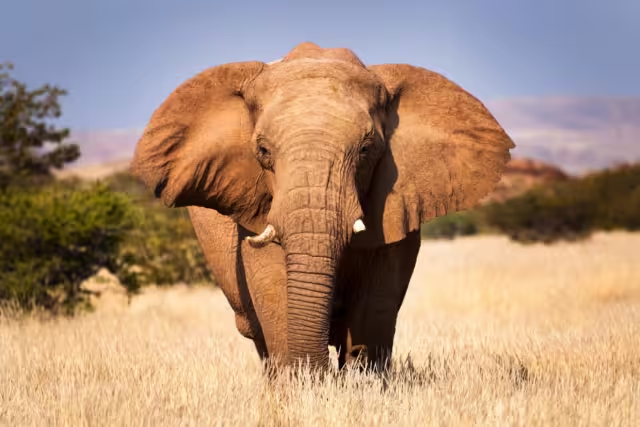British high commissioner backs plan to shoot scores of endangered animals but conservationists warn of ‘dangerous precedent’
Plans by the Namibian government to kill 83 elephants and 640 other wild animals to feed the meat to people have sparked a fierce international row.
The British high commissioner to the country is among those backing the idea, but ecologists are warning of a “colossal disaster” for Africa’s wildlife.
Hunters are being brought in to shoot the animals dead because of a severe drought across southern Africa that has left some people struggling for food, the environment ministry says. It’s understood the mass cull has already begun, with the elephants due to be shot this week.
Already 157 animals have been hunted by professional hunters and companies contracted by the government, yielding more than 56,800kg of meat.
Officials say nearly half of Namibia’s population is forecast to experience food insecurity in the coming months following the drought.
As well as the 83 elephants, those to be culled – in national parks and communal areas – are 30 hippos, 60 buffalos, 50 impalas, 100 blue wildebeest, 300 zebras and 100 eland antelopes.
Setting out regions where the elephants will be killed, the Ministry of Environment, Forestry and Tourism said: “This offtake will assist in reducing the negative impact of drought on the conservation of wild animals in both our national parks and communal areas.”
They said human-wildlife conflicts were expected to increase without intervention.
British high commissioner Charles Moore wrote on social media: “Namibia is very responsible in its use of natural resources. None of the species are endangered, so it’s a good/rational solution to help 300k+ people in desperate need. Sheltering animals won’t help.”
But the status of elephants there is contested. Adam Cruise, a wildlife investigative journalist in Cape Town, says numbers in Namibia are falling, and the International Union for Conservation of Nature red list of conservation classifies African elephants as either endangered or critically endangered.
However, according to World Population Review, the latest estimate indicates Namibia has more than 24,000 elephants, a rise of 5.36 per cent in a year.
A report by African conservationists and scientists suggests the cull is motivated by forthcoming national elections and lacks environmental or food security assessments.
The experts are anonymous in the report because they say they face considerable risks, many having received threats or being subjected to actions such as “the revocation of permits, deportation, or worse”.
“This oppressive environment tragically results in media outlets often publishing government statements and strategies without the benefit of opposing views from the conservation community,” the report warns.
The authors warn culling will hit tourism, and that cattle do not graze in national parks so culling there will not help livestock farmers outside them, as the ministry insists.
“Elephants who witness culling, which typically targets entire families including young calves, is well established to exacerbate human-elephant conflict, rather than relieve it. Elephants who escape are known to experience lasting trauma from witnessing family members being shot,” the report says.
The ministry said in its announcement: “This exercise is necessary and is in line with our constitutional mandate where our natural resources are used for the benefit of Namibian citizens.
“This is also a prime example that conservation of game is really beneficial…
“Not only do Namibians benefit through the meat provided for drought relief, but the ministry has over the years supplied meat for national, regional, and traditional events in line with our policies and laws.

“Game meat benefits are also extended to communities in rural areas especially those in conservancies.”
But Dr Cruise told the BBC: “It’s a bit insulting to toss a bit of game meat in the direction of starving, impoverished people, living on subsistence basis without any kind of meaningful developments in terms of employment opportunities and general social development.”
According to elephant biologist Dr Keith Lindsay, the cull will provide only short-term relief and set a dangerous precedent of reliance on wildlife to solve human problems.
He said: “This practice, if adopted and normalised, is very likely to create a continuing demand on vulnerable wildlife populations that would be unsustainable in the dwindling areas of natural habitat.

“There is also the risk that it will give neighbouring nations a strong case for doing so as well, triggering a colossal disaster.”
The UK-based Action for Elephants organisation warned of “similar schemes on an even bigger scale by unscrupulous governments” across Africa.
“If other African countries with depleted wildlife see that no action is taken this time, no protest lodged, and no consequences to face, they will feel emboldened to do the same,” it said.
Izak Smit, of the Desert Lions Humans Relations Aid organisation told the ministry in a letter: “It has become clear that the human-wildlife-conflict thingy has become a very handy tool and scapegoat to accommodate abuse and dark agendas, one of which is availing trophies in cases where it cannot be justified in terms of sustainability.”








